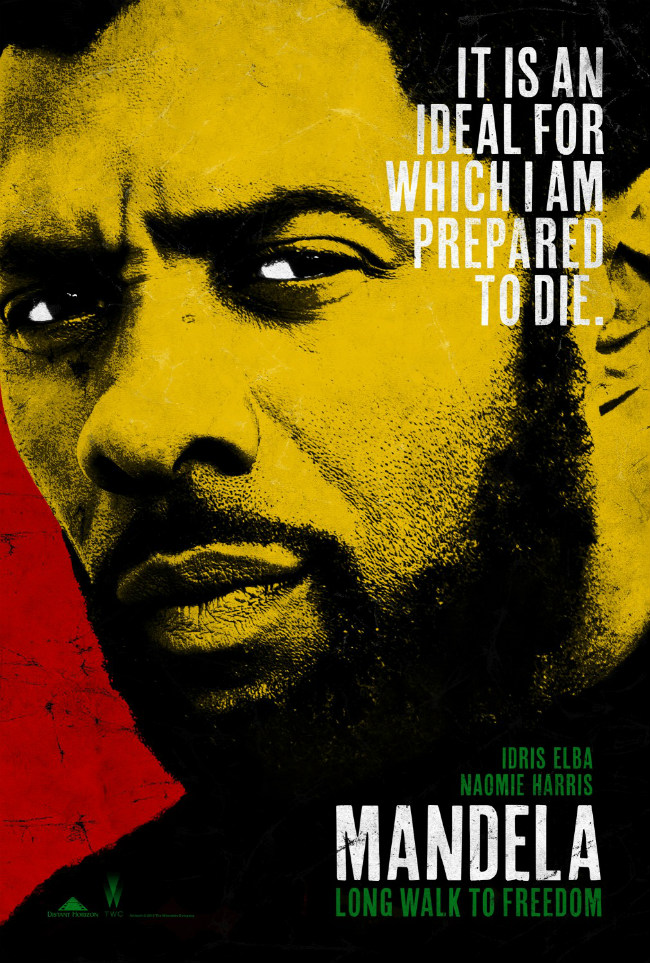 Mandela: Long Walk to Freedom
Mandela: Long Walk to Freedom
Directed by: Justin Chadwick Cast: Idris Elba, Naomie Harris Running Time: 2 hrs 20 mins Rating: PG-13 Release Date: December 25, 2013
PLOT: The story of Nelson (Elba) and Winnie Mandela's (Harris) revolution against apartheid in South Africa.
WHO'S IT FOR? Those who can manage biopics where the performers are stronger than the story itself. This film would also be useful to certain viewers as a concise introduction to Nelson Mandela.
OVERALL
The life of Nelson Mandela, one that represents the incredible potential of a human being, is a story that could easily devolve to cinematic canonization. In the latest film about his world-changing accomplishments, Mandela: Long Walk to Freedom, he not does receive such a treatment, as his purely human characteristics are not lost to unjust over-protection. However, it is his story itself that is not done proper justice in this recreation, due to imperfect assembly, but most importantly, a lack of continuation of Mandela’s dynamic spirit.
As someone not from South Africa, nor one with a similar facial structure to that of Mandela's, Idris Elba provides an alpha presence in a performance that most of all captures the essence of the world leader. Dispensing wisdom throughout the script, in both voiceover and to other characters, Elba is able to keep this sharp-witted character from becoming non-human. Through the delivery of a few excellent monologues, especially one in the third-act in which he provides symbolic forgiveness for his treatment, he provides a gripping stalwart portrayal. Elba illustrates how a man, gifted with intellect that he uses for public influence, could lead people together into the darkest of political conflicts, and similarly, how he could lead them out.
The subdued words of Elba's subdued Nelson are given a charge of equal yet opposite strength with Naomie Harris' Winnie, who provides a more outwardly enraged form of angst against the apartheid. In her scenes of post-jail pontification, she ferociously screams at the top of her lungs, her fist punching the air, her eyes suggest a purity of intensity. Though her character lacks in the same amount of care as Nelson, Harris passion ensures that Winnie's screen-time becomes a formidable representation of the argument that is against peace; one to stand right against the more celebrated teachings of her husband.
As a film project, prepared by South African producer Anant Singh since the autobiography’s release, Mandela: Long Walk to Freedom is a collection of individual filmmaking promises. Boasting the largest budget of a film to be made in Africa, the movie uses many authentic locations for its events, with others that have been changed by time recreated in great detail by large crews within Cape Town Film Studios. With vista shots used to bookend the story, and numerous scenes involving the organization of hundreds of extras (some of whom witnessed the true events first-hand), the film is also captured in classic 35mm.
When these elements are assembled by British director director Justin Chadwick, the total result is not as strong as the truth behind Mandela's spirit may need. While screenwriter William Nicholson's script earns some edge by presenting Mandela's personal moral imperfections, Chadwick rarely shows an inspired outlook on the material. In the film's press notes, he references both the films of David Lean and City of God (2002) as aesthetic influences, but the energy of capturing an epic story with handheld camera intimacy is scant, and when presented it gives no charge to the rest of the film.
Similarly, while presenting this big picture built of many small details, poor assembly becomes a burden when trying to follow the many chapters of this story. The film's editing gets too economical with crucial details, such as the locations and reasons that are scantly defined when Mandela is involved with bombings by the ANC. Not only does this underwhelm the striking scenes themselves, but also the point of involving those who are unfamiliar with this part of Mandela's life into any type of debate. In another instance, one disturbing massacre scene is shown synonymously, but in indication of the film’s broader dramatic intentions, it does bookend the scene with a baby crying.
When condensing certain passages of time to montages that mix film footage with actual news documentation, such events prove to be less succinctly informative than full scenes themselves. Audio clips, as placed on top of visuals, are of little assistance when it comes to placing the visuals to a certain time period or geography. When mixing in real footage of protests and struggle, sometimes an image of the real Mandela pops up, which also provides distraction to this film’s own non-fictional vision.
Though aiming for grander heights, Mandela: Long Walk to Freedom remains a fair biopic about a great human being. The spirit of Mandela’s efforts is in place, especially with Elba’s help, but the movie lacks the attitude that is crucially within his revolution’s DNA. Chadwick’s film does not echo the world-changing fervor behind the chants or the clenched fists that fueled Mandela’s greatest work, it simply shows them.
FINAL SCORE: 4/10
